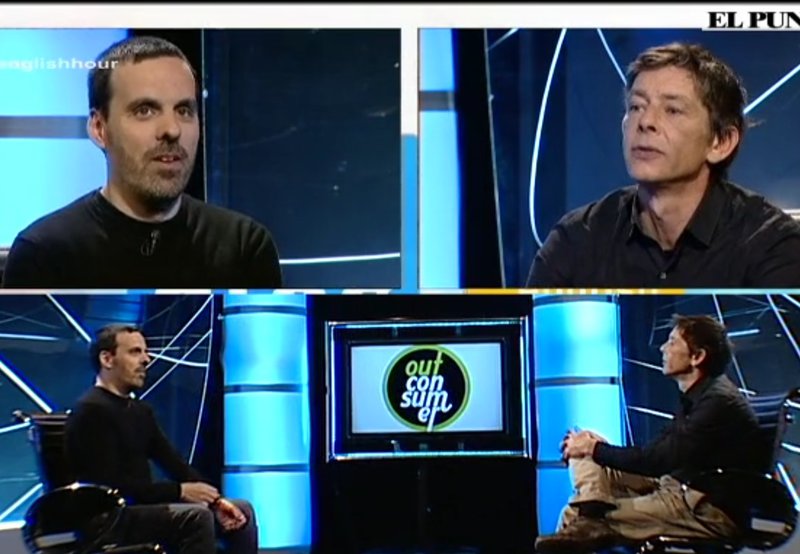Interview
Your 'friend' on the Internet

Do I call you a YouTuber? Or an influencer?
I don't like any of those names; I just try to communicate with people, but I suppose influencer is the word.
What does that entail?
I tell stories related to video games. I play video games and I have fun, and try to explain how it makes me feel so that people can relate. When I'm playing, stories come into my head and I try to explain them, like you would to a friend. I try to do so with a little humour. I also do video blogs and sometimes just talk to the camera about my life. For example, I am a parent now and I have a very young audience, so I think it's interesting for them to hear from a ‘friend' who has more experience than them who can explain something useful. That is the main goal.
How did it come about?
I started six years ago but it was never planned. I don't have a business plan, it's just whatever happens and it feels more natural like that. I started out because I wanted to explain things to people, and then it started growing and I started making money until it became impossible to do my job and at the same time the YouTube channel, so I had to decide between them. Since then it has evolved as I evolve and the business evolves. I see it as an opportunity to do different things and I am in a very privileged position in which people listen to me, so I try to take advantage of that. But it wasn't planned.
How do you make money?
There are four sources of income. One is direct advertising on the site, the banners and so on, which you get a share of. Another is sponsorship, when companies pay you to say something, to wear something, to show something. Then there is you own merchandising: you write a book, you get shirts made, which the people who like you pay for. And the fourth is donations, like crowdfunding. Most YouTubers have a balance between the four types.
Is it hard maintaining these sources?
You are on you own, which is the beauty of it. That makes it hard but also rewarding. It is still not an established industry, but now it is easier. In the beginning it was like the Wild West. Your capital, your value comes from your fans – how many you have are and what your relationship with them is. If you have a good relationship and they are engaged and listen to you, then you have a lot of value. And if you have a lot of value, the rest just comes. But the first thing, and the hardest, is harvesting your fan base. And what is very important is that it is not just the number of fans, but the relationship you have with them.
Explain that relationship.
I may have more than 700,000 subscribers but not every one might want to watch every video, or maybe they watch it but don't care about what you say. However, if you say this video game is really good and you should buy it, and they go and buy it, then you have value, because you are able to influence them. Let's say you have a problem and you need money, and they send you money, then you have real engagement. It's not always about money, but imagine you have 2,000 followers, which doesn't seem like a lot, but if they all do what you say, for example, about trains, making you strong in that sector, then you have value. You might have content that goes viral and everyone sees it, but if they don't engage and react to it, then there is no value. If a company says its product is the best, no one believes them, but if my ‘friend' on the internet says it's good and he uses it, then maybe I'll believe it.
That's a big responsibility.
As your value is your relationship with your viewers, if you lie to them then your capital falls. That makes it risky to lie or mislead because in the long run you lose out. And if your capital drops then it is hard to come back from that. It's just you and so it's easy to fall into the trap of feeling you are perfect, which is obviously not true. There is the temptation to take a lot of money to say what they want you to say. What I do now is I only advertise products I really like and use, and I always say it is an advertisement. You don't lie to your friends, and on YouTube it is the same.
What about the temptation just to please your followers?
That's tricky because it is a contradiction: you want to please them but at the same time you want to be authentic and true to yourself. I decided I was going to do my thing, what I like and hopefully you will like it too. If not, you can go crazy. Imagine asking a thousand people what they like, it's impossible to please them all. That makes it important to do what I like.
Is there much rivalry between YouTubers?
It was nasty five years ago, because it was the Wild West and we didn't know any better. Then we saw that way everyone loses. If two YouTubers are fighting, both lose because you share the same fans. The best idea is to collaborate, if you work together then it is win-win.
Leave a comment
Sign in.
Sign in if you are already a verified reader.
I want to become verified reader.
To leave comments on the website you must be a verified reader.
Note: To leave comments on the website you must be a verified reader and accept the conditions of use.




